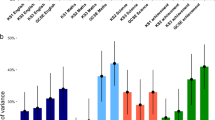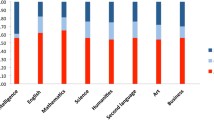Abstract
The study subjected nine elementary cognitive task variables from the Cognitive Assessment Tasks (CAT) and three scholastic measures from the Metropolitan Achievement Test (MAT) to phenotypic and behavioral genetic structural equation modeling based on data for 277 pairs of same sex monozygotic (MZ) and dizygotic (DZ) twins from the Western Reserve Twin Project. Phenotypic and behavioral genetic covariation between certain elemental cognitive components and scholastic performance was examined to determine (a) whether these elemental cognitive components contribute substantially to the variance of scholastic performance; (b) whether such contributions vary across different domains of school knowledge or from specific domains to a general aptitude; (c) the behavioral genetic composition of the elemental cognitive components and the scholastic variables; and (d) how the association between the cognitive components and scholastic performance is genetically and environmentally mediated. The results of the study showed that as much as 30% of the phenotypic variance of scholastic performance was accounted for by the CAT general factor, which was presumably related to mental speed. A mainly genetic covariation was found between the mental speed component and scholastic performance, although each of the two variables was strongly influenced by both heritability and common family environment. The magnitude and etiology of the covariation were largely invariant whether mental speed was related to a common scholastic aptitude or to individual achievement measures covering different knowledge domains. Taken in conjunction with previous findings that mental speed has a substantial genetic correlation with psychometric g, and psychometric g has a mostly genetic covariation with scholastic achievement, the findings of the present study seems to point to a more global picture; namely, there is a causal sequence that starts from mental speed as the explanatory factor for both psychometric g and scholastic performance, and the etiology of the causal link is chiefly genetic.
Similar content being viewed by others
References
Baker, L. A., Vernon, P. A., and Ho, H.-Z. (1991). The genetic correlation between intelligence and speed of information processing. Behav. Genet. 21:351-367.
Bentler, P. M., and Bonett, D. G. (1980). Significance tests and goodness of fit in the analysis of covariance structures. Psychol. Bull. 88:588-606.
Bentler, P. M. (1990). Comparative fit indexes in structural models. Psychol. Bull. 107:238-246.
Brooks, A., Fulker, D. W., and DeFries, J. C. (1990). Reading performance and general cognitive ability: A multivariate genetic analysis of twin data. Personality Individual Differences 11:141-146.
Cardon, L. R., DiLalla, L. F., Plomin, R., DeFries, J. C., and Fulker, D. W. (1990). Genetic correlations between reading performance and IQ in the Colorado Adoption Project. Intelligence 4:245-257.
Cardon, L. R., Fulker, D. W., DeFries, J. C., and Plomin, R. (1992). Multivariate genetic analysis of specific cognitive abilities in the Colorado Adoption Project at age 7. Intelligence 16:383-400.
Ceci, S. J. (1991). How much does schooling influence intellectual development and its cognitive components? A reassessment of the evidence. Dev. Psych. 27:703-722.
Ceci, S. J. (1992). Schooling and intelligence. Psychol. Sci. Agenda 5:7-9.
Deary, I. J. (1980). How general is the mental speed factor in “general” intelligence: An attempt to extend inspection time to the auditory modality. B.S. honors thesis, University of Edinburgh, Scotland.
Deary, I. J. (1986). Inspection time: Discovery or rediscovery? Personality Individual Differences 7:625-632.
Detterman, D. K. (1990). Manual for the Cognitive Assessment Tasks battery. Technica Manual.
Freason, W. M., and Eysenck, J. J. (1986). Intelligence, reaction time (RT) and a new “odd-man-out” RT paradigm. Personality Individual Differences 7:807-817.
Fraser, C., and McDonald, R. P. (1988). COSAN: Covariance structure analysis. Multivariate Behav. Res. 23:263-265.
Ho, H.-Z., Baker, L. A., and Decker, S. N. (1988). Covariance between intelligence and speed of cognitive processing: Genetic and environmental influences. Behav. Genet. 18:247-261.
Jensen, A. R. (1982a). Reaction time and psychometric g. In J. J., Eysenck (ed.), A model for intelligence (pp. 93-132). New York: Springer.
Jensen, A. R. (1982b). The chronometry of intelligence. In R. J., Sternberg (ed.), Advances in the psychology of human intelligence, Vol. 1 (pp. 255-310). Hillsdale, NJ: Eribaum.
Jensen, A. R. (1987). Individual differences in the Hick paradigm. In P. A., Vernon (ed.), Speed of information-processing and intelligence. 18 Norwood, NJ: Ablex.
Jensen, A. R. (1998). The g factor. Westport, CT: Praeger Publishers.
Krane, W. R., and McDonald, R. P., (1978). Scale invariance and the factor analysis of correlation matrices. Br. J. Math. Stat. Psychol. 31:217-228.
Lange, K., Westlake, J., and Spence, M. A. (1976). Extensions to pedigree analysis. III. Variance components by the scoring method. Ann. Hum. Genet. 39:485-491.
Luo, D., and Petrill, S. (1999). Elementary cognitive tasks and their roles in g estimates. Intelligence 27(2):157-174.
Marsh, H. W., Balla, J. R., and McDonald, R. P. (1988). Goodnessof-fit indexes in confirmatory factor analysis: The effect of sample size. Psychol. Bull. 103:391-410.
Miller, L. T., and Vernon, P. A. (1992). The general factor in short term memory, intelligence, and reaction time. Intelligence 16:5-30.
Nettlebeck, T., and Lally, M. (1976). Inspection time and measured intelligence. Br. J. Psychol. 67:17-22.
Neale, M. C. (1991). MX: Statistical modeling. Richmond, VA: Department of Human Genetics.
Nichols, R. C., and Bilbro, W. C. (1966). The diagnosis of twin zygosity. Acta Genet. 16:265-275.
Raz, N., Willerman, L., Lgmundson, P., and Hanlon, M. (1983). Aptitude-related differences in auditory recognition masking. Intelligence 7:71-90.
Raz, N., and Willerman, L. (1985). Aptitude-related differences in auditory information processing: Effects of selective attention and tone duration. Personality Individual Differences 6:299-304.
Schmid, J., and Leiman, J. (1957). The development of hierarchical factor solutions. Psychometrika 22:53-61.
Steiger, J. H., and Lind, J. C. (1980). Statistically based tests for the number of common factors. Article presented at the annual meeting of the Psychometric Society, Iowa City, IA.
Thompson, L. A., Detterman, D. K., and Plomin, R. (1991). Associations between cognitive abilities and scholastic achievement: Genetic overlap but environmental differences. Psychol. Sci. 2:158-165.
Tucker, L. R., and Lewis, C. (1973). The reliability coefficient for maximum likelihood factor analysis. Psychometrika 38:1-10.
Vernon, P. A. (1987). Speed of information processing and intelligence. Norwood, NJ: Ablex.
Wechsler, H. S. (1977). The qualified student. New York: John Wiley and Sons.
Rights and permissions
About this article
Cite this article
Luo, D., Thompson, L.A. & Detterman, D.K. Phenotypic and Behavioral Genetic Covariation Between Elemental Cognitive Components and Scholastic Measures. Behav Genet 33, 221–246 (2003). https://doi.org/10.1023/A:1023438323100
Issue Date:
DOI: https://doi.org/10.1023/A:1023438323100




